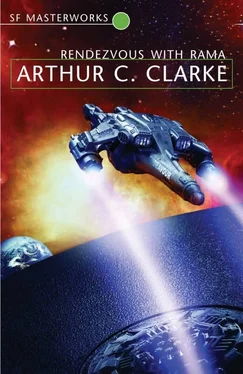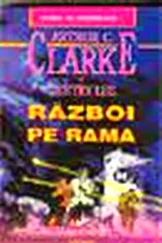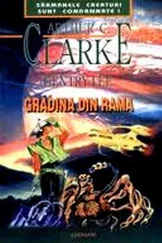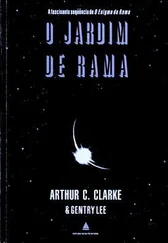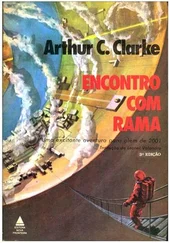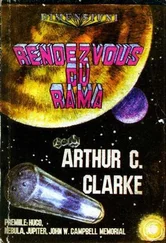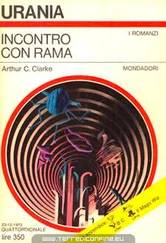“And they are dead; I’ll stake my reputation on that. All the samples we’ve taken from the interior are absolutely sterile—we’ve not found a single micro-organism. As for the talk you may have heard about suspended animation, you can ignore it. There are fundamental reasons why hibernation techniques will only work for a very few centuries—and we’re dealing with time spans a thousand-fold longer.”
“So the Pandorans and their sympathizers have nothing to worry about. For my part, I’m sorry. It would have been wonderful to have met another intelligent species.”
“But at least we have answered one ancient question. We are not alone. The stars will never again be the same to us.”
10. Descent into Darkness
Commander Norton was sorely tempted but, as captain, his first duty was to his ship. If anything went badly wrong on this initial probe, he might have to run for it.
So that left his second officer, Lieut-Commander Mercer, as the obvious choice. Norton willingly admitted that Karl was better suited for the mission.
The authority on life-support systems, Mercer had written some of the standard textbooks on the subject. He had personally checked out innumerable types of equipment, often under hazardous conditions, and his biofeedback control was famous. At a moment’s notice he could cut his pulse-rate by fifty per cent, and reduce respiration to almost zero for up to ten minutes. These useful little tricks had saved his life on more than one occasion.
Yet despite his great ability and intelligence, he was almost wholly lacking in imagination. To him the most dangerous experiments or missions were simply jobs that had to be done. He never took unnecessary risks, and had no use at all for what was commonly regarded as courage.
The two mottoes on his desk summed up his philosophy of life. One asked WHAT HAVE YOU FORGOTTEN? The other said HELP STAMP OUT BRAVERY. The fact that he was widely regarded as the bravest man in the Fleet was the only thing that ever made him angry.
Given Mercer, that automatically selected the next man—his inseparable companion Lt. Joe Calvert. It was hard to see what the two had in common; the lightly-built, rather highly strung navigating officer was ten years younger than his stolid and imperturbable friend, who certainly did not share his passionate interest in the art of the primitive cinema.
But no one can predict where lightning will strike, and years ago Mercer and Calvert had established an apparently stable liaison. That was common enough; much more unusual was the fact that they also shared a wife back on Earth, who had borne each of them a child. Commander Norton hoped that he could meet her one day; she must be a very remarkable woman. The triangle had lasted for at least five years, and still seemed to be an equilateral one.
Two men were not enough for an exploring team; long ago it had been found that three was the optimum—for if one man was lost, two might still escape where a single survivor would be doomed. After a good deal of thought, Norton had chosen Technical Sergeant Willard Myron. A mechanical genius who could make anything work—or design something better if it wouldn’t—Myron was the ideal man to identify alien pieces of equipment. On a long sabbatical from his regular job as Associate Professor at Astrotech, the Sergeant had refused to accept a commission on the grounds that he did not wish to block the promotion of more deserving career officers. No one took this explanation very seriously and it was generally agreed that Will rated zero for ambition. He might make it to Space Sergeant, but would never be a full professor. Myron, like countless NCOs before him, had discovered the ideal compromise between power and responsibility.
As they drifted through the last airlock and floated out along the weightless axis of Rama, Lt. Calvert found himself, as he so often did, in the middle of a movie flashback. He sometimes wondered if he should attempt to cure himself of this habit, but he could not see that it had any disadvantages. It could make even the dullest situations interesting and—who could tell?—one day it might save his life. He would remember what Fairbanks or Connery or Hiroshi had done in similar circumstances…
This time, he was about to go over the top, in one of the early-twentieth-century wars; Mercer was the sergeant leading a three-man patrol on a night raid into no-man’s land. It was not too difficult to imagine that they were at the bottom of an immense shell-crater, though one that had somehow become neatly tailored into a series of ascending terraces. The crater was flooded with light from three widely-spaced plasma-arcs, which gave an almost shadowless illumination over the whole interior. But beyond that—over the rim of the most distant terrace—was darkness and mystery.
In his mind’s eye, Calvert knew perfectly well what lay there. First there was the flat circular plain over a kilometre across. Trisecting it into three equal parts, and looking very much like broad railroad tracks, were three wide ladders, their rungs recessed into the surface so that they would provide no obstruction to anything sliding over it. Since the arrangement was completely symmetrical, there was no reason to choose one ladder rather than another; that nearest to Airlock Alpha had been selected purely as a matter of convenience.
Though the rungs of the ladders were uncomfortably far apart, that presented no problem. Even at the rim of the Hub, half a kilometre from the axis, gravity was still barely one thirtieth of Earth’s. Although they were carrying almost a hundred kilos of equipment and life-support gear, they would still be able to move easily hand overhand.
Commander Norton and the back-up team accompanied them along the guide ropes that had been stretched from Airlock Alpha to the rim of the crater; then, beyond the range of the floodlights, the darkness of Rama lay before them. All that could be seen in the dancing beams of the helmet lights was the first few hundred metres of the ladder, dwindling away across a flat and otherwise featureless plain.
And now, Karl Mercer told himself, I have to make my first decision. Am I going up that ladder, or down it?
The question was not a trivial one. They were still essentially in zero gravity, and the brain could select any reference system it pleased. By a simple effort of will, Mercer could convince himself that he was looking out across a horizontal plain, or up the face of a vertical wall, or over the edge of a sheer cliff. Not a few astronauts had experienced grave psychological problems by choosing the wrong coordinates when they started on a complicated job.
Mercer was determined to go headfirst, for any other mode of locomotion would be awkward; moreover, this way he could more easily see what was in front of him. For the first few hundred metres, therefore, he would imagine he was climbing upward, only when the increasing pull of gravity made it impossible to maintain the illusion would he switch his mental directions one hundred and eighty degrees.
He grasped the first rung and gently propelled himself along the ladder. Movement was as effortless as swimming along the seabed—more so, in fact, for there was no backward drag of water. It was so easy that there was a temptation to go too fast, but Mercer was much too experienced to hurry in a situation as novel as this.
In his earphones, he could hear the regular breathing of his two companions. He needed no other proof that they were in good shape, and wasted no time in conversation. Though he was tempted to look back, he decided not to risk it until they had reached the platform at the end of the ladder.
The rungs were spaced a uniform half metre apart, and for the first portion of the climb Mercer missed the alternate ones. But he counted them carefully, and at around two hundred noticed the first distinct sensations of weight. The spin of Rama was starting to make itself felt.
Читать дальше
